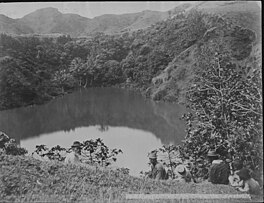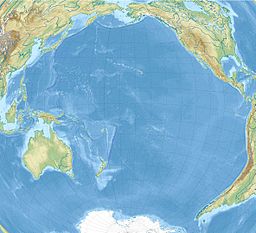Green Lake[1] (Hawaiian: Ka Wai o Pele)[2] was a freshwater crater lake in Puʻu Kapoho crater on the island of Hawaiʻi. With a surface area of 0.8 hectares (2.0 acres) and a maximum depth of 61 metres (200 ft),[3] it was the largest natural freshwater lake in the Hawaiian Islands,[4] and, along with Lake Waiau, was one of two freshwater lakes on Hawaiʻi Island.
| Green Lake | |
|---|---|
| Ka Wai o Pele | |
 Green Lake, photographed in the 1890s | |
| Location | Hawaiʻi, United States |
| Coordinates | 19°30′08″N 154°50′22″W / 19.5023164°N 154.8393238°W |
| Type | Volcanic crater lake |
| Basin countries | United States |
| Surface area | 0.5 ha (1.2 acres) |
| Max. depth | 61 m (200 ft) |
Hawaiian myths state that the lake was the first place visited by Pele, the volcano deity.[5] The lake was a popular swimming spot for locals and tourists.[6] Extensive vegetation, mainly Hibiscus tiliaceus, overhung the lake, shading about twenty percent of the lake's surface.[4]
On June 2, 2018, the lake was destroyed when lava flowing from Kīlauea's lower Puna eruption boiled it away and completely filled the basin.[7][8]
-
Ka Wai o Pele
-
Aerial photograph of lava flows evaporating Green Lake on June 2, 2018
See also
editReferences
edit- ^ U.S. Geological Survey Geographic Names Information System: Green Lake
- ^ Nicole Lautze, Donald Thomas, Nicholas Hinz, Garrett Apuzen-Ito, Neil Frazer, David Waller: Play fairway analysis of geothermal resources across the State of Hawaii: 1. Geological, geophysical, and geochemical datasets, in: Geothermics (article in press), URL https://dx.doi.org/10.1016/j.geothermics.2017.02.001, p. 10
- ^ https://www.hawaiinewsnow.com/story/38346982/where-pele-first-visited-residents-react-to-the-loss-of-a-400-year-old-lake-due-to-lava/ (retrieved 2020-05-04)
- ^ a b Maciolek, J.A. (April 30, 1982). "Lakes and Lake-like Waters of the Hawaiian Archipelago" (PDF). Occasional Papers of Bernice P. Bishop Museum. 25 (1): 7, 11. Retrieved 5 December 2018.
- ^ Ellis, William (1831). Polynesian Researches, Volume 4. London: Fisher, Son, & Jackson. p. 299. OCLC 935366901. Retrieved June 5, 2018 – via Internet Archive.
- ^ Morris, Chris (June 5, 2018). "Lava Evaporates Hawaii's Largest Lake". Fortune. Retrieved June 5, 2018.
- ^ Peterkin, Olivia (June 4, 2018). "Into thin air: Lava flows claim Hawaii's largest lake in a matter of hours". Hawaii News Now. Retrieved June 5, 2018.
- ^ Comparison of satellite images on February 19 and August 6, 2018 (Planet Labs Inc.)
External links
edit- Peter T Young: Ka Wai O Pele



